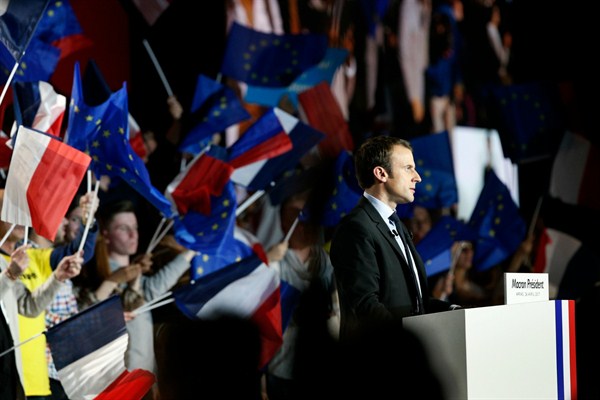On Sunday, centrist candidate Emmanuel Macron came out on top in the first round of France’s presidential election. He will face far-right firebrand Marine Le Pen in the May 7 runoff. Macron, a pro-European Union independent who now has the backing of the French political establishment, is expected to defeat Le Pen come May, securing the presidency. But on the heels of a surprise-filled campaign that exposed deep divergences in French society, and against the backdrop of the stunning outcomes in the Brexit referendum and U.S. presidential election, nothing is certain. World Politics Review has compiled 10 articles that put the heated campaign in context—and assess what could come next for French domestic and foreign policy.
The Overlooked Takeaway From France’s First-Round Election Results
While there is nothing wrong with the widespread narrative surrounding the first-round results of France’s presidential election, it obscures as much as it reveals, WPR Editor-in-Chief Judah Grunstein wrote in his column yesterday. Macron’s victory would indeed represent another major setback for the kind of populist nationalism many feared would sweep across Europe. But a closer look at the outcome shows that France is an almost evenly divided country, essentially drawn and quartered by four diametrically opposed reform agendas. That will complicate his ability to govern, should he go on to win.
In March, Grunstein mapped out the likely scenarios for France’s presidential election, all of which hinted that a period of radical restructuring is ahead for the French party system. Even the possibility of a hung parliament still cannot be ruled out. If such a power vacuum emerges, he wrote, the consequences would be dramatic not just for France, but also for the rest of Europe.
Terrorism, immigration and the economy dominated the campaign, but foreign policy has hardly been absent from the discussion, and nowhere in the world does France have a larger imprint than Africa, Karina Piser explained last week. For Macron and Le Pen, what role should France play in Africa?
U.S. President Donald Trump has expressed deep skepticism of the NATO alliance and open hostility to the EU—a position he has recently softened. But both positions were also on display among the major first-round candidates in France. Le Pen’s first-round success means there is a non-negligible chance the next French president will seek to leave both the alliance and the EU. But, Grunstein wrote in February while assessing the far-right candidate’s platform, don’t expect that shared skepticism to guarantee warm ties between Paris and Washington.
Protests and strikes paralyzed French Guiana last month, as residents of the French overseas department demanded better security, jobs and social services—a call that resonated all the way to the campaign trail. Though a negotiated settlement has since been reached, the question, as Piser put it at the time, remains: Can the next French president find a sustainable solution to the longstanding grievances in France’s overseas territories and departments?
The Background to the Vote
Entering the final year of his presidency, President Francois Hollande was in the weakest position by far of any president in the history of France’s Fifth Republic. Last April, Arun Kapil assessed his troubled record: Many voters on the left were dismayed that the outgoing leader pushed through a series of controversial measures seen as incomprehensible coming from a Socialist president. Hollande now leaves office with unprecedentedly low popularity that underscores his decision to not even run for a second term—and also reflects popular discontent with France’s traditional parties.
A string of tragic terror attacks has brought security to the fore of France’s political debate. The timing of last July’s massacre in Nice—just one week after a parliamentary committee called for an overhaul of France’s intelligence services—exacerbated the issue’s divisiveness, Piser argued. Now, Le Pen is calling for hard-line security measures that many say would compromise civil liberties, while Macron pushes a platform more in continuity with his predecessor. It remains to be seen if France can implement the much-needed reforms to keep its citizens safe.
The controversy over local bans on the “burkini” last summer highlighted the ways in which immigration and national identity have become prominent features of France’s political debates—often exploited opportunistically. Commenting on the bans last September, Grunstein noted that both immigration and tourism involve transformative effects of mass mobility on societies. But while concerns over tourism’s impact are considered reasonable, anxiety over immigration’s impact tends to be dismissed as xenophobia or racism.
Last November, Piser catalogued France’s escalating migrant crisis in the wake of the closure of its largest migrant camp—the so-called Jungle in the northern city of Calais. The Jungle was dismantled the month prior, leaving many to ask what would happen to its 9,000 residents. The answer became clear, as thousands of migrants and refugees formed camps in northern Paris, causing outcry from locals and prompting authorities to respond.
Hollande’s domestic approval ratings were so dire that he chose not to run for a second term. But for Richard Gowan, his legacy isn’t all gloom and doom: On Hollande’s watch, France has managed to maintain an outsized role in multilateral diplomacy and conflict management. He departs, Gowan wrote last week, just as his brand of Gallic globalism faces an existential crisis.
Related

